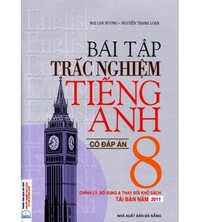Vocabulary & Grammar - Trang 19 Unit 9 VBT Tiếng Anh 8 mới
Find the odd A, B, C or D.
Bài 1
Task 1. Find the odd A, B, C or D.
(Tìm từ khác loại)
1. A. thunderstorm B. storm C. tornado D. disaster
2. A. drought B. flood C. climate D. mudslide
3. A. thunderstorm B. typhoon C. pollutant D. tsunami
4. A. erupt B. collapse C. damage D. destroy
5. A groundwater B. mineral water C. fresh water D. drink
Lời giải chi tiết:
1. D
thunderstorm: dông
storm: bão táp
tornado: lốc xoáy
disaster: thảm họa
Đáp án: D Từ khác loại là disaster (mang nghĩa bao hàm, còn lại mang nghĩa cụ thể)
2. C
drought: hạn hán
flood: lũ lụt
climate: khí hậu
mudslide: lở đất
Đáp án: C Từ khác loại là climate (các từ còn lại mang nghĩa cụ thể chỉ các hiện tượng )
3. C
thunderstorm: dông
typhoon: bão
pollutant: chất ô nhiễm
tsunami: sóng thần
Đáp án: C Từ khác loại là pollutant (các từ còn lại chỉ các hiện tượng thiên nhiên )
4. A
erupt: phun ra
collapse: sự sụp đổ
damage: hư hại
destroy: hủy hoại
Đáp án: A. Từ khác loại là erupt (những từ còn lại là từ đồng nghĩa)
5. D
groundwater: nước ngầm
mineral water: nước khoáng
fresh water: nước ngọt
drink: uống
Đáp án: D Từ khác loại là drink (động từ, những từ còn lại là danh từ)
Bài 2
Task 2. Use the words or phrases in the box to label each picture.
(Sử dụng những từ và cụm từ trong khung để nhận dạng mỗi bức tranh.)

Phương pháp giải:
tornado: lốc xoáy
drought: hạn hán
thunderstorm: dông
flood: lũ lụt
tsunami: sóng thần
earthquake: Động đất
snowstorm: bão tuyết
typhoon: bão
Lời giải chi tiết:
1. typhoon
2. thunderstorm
3. tsunami
4. earthquake
5. drought
6. tornado
Bài 3
Task 3. Choose the correct option for each gap in the sentences.
(Chọn đáp án đúng cho mỗi chỗ trống.)
1. Typhoons are severe tropical storms. They sometimes happen in my …………
A. stay B. home C. house D. hometown
2. When a typhoon happened, many houses and roads ……………….destroyed or flooded.
A. is B. are C. was D. were
3. Last year, there was a big typhoon in my area. It caused extensive damage to our ………….
A. property B. furniture C. wealth D. savings
4. The government sent rescue food, drink and medical supplies to ………….homes.
A. flood B. flooding C. flooded D. floods
5. All people who were without homes in the flood were provided with ……… accommodation.
A. short B. temporary C. present D. instant
6. When the earthquake happened, most people in this building managed to run ………. of it.
A. quickly B. fast C. smoothly D. out
7. ………………. is the most common natural disaster in your country? - Snowstorms.
A. What B. Which C. How D. Who
8. The …………………buried the whole village while people were sleeping in their houses.
A. mudslide B. tornado C. drought D. thunderstorm
9. …………… workers were sent to the area immediately but no villagers survived when the landslide happened.
A. rescue B. help C. assistance D. volunteer
10. What ……………… we do to prevent these natural disasters?
A. may B. ought C. should D.be able
Lời giải chi tiết:
1. D
stay: ở lại
home: nhà
house: nhà ở
hometown: quê nhà
Typhoons are severe tropical storms. They sometimes happen in my hometown
(Bão là những cơn bão nhiệt đới nghiêm trọng. Chúng đôi khi xảy ra ở quê tôi.)
2. D
Sự việc xảy ra trong quá khứ, chủ ngữ là danh từ số nhiều => were
When a typhoon happened, many houses and roads were destroyed or flooded.
(Khi một cơn bão xảy ra, nhiều ngôi nhà và đường bị phá hủy hoặc ngập lụt.)
3. A
property: bất động sản
furniture: đồ nội thất
wealth: sự giàu có
savings: tiết kiệm
Last year, there was a big typhoon in my area. It caused extensive damage to our property
(Năm ngoái, có một cơn bão lớn trong khu vực của tôi. Nó gây thiệt hại lớn cho tài sản của chúng tôi.)
4. C
Chỗ cần điền là một tính từ bổ sung ý nghĩa cho danh từ homes
The government sent rescue food, drink and medical supplies to flooded homes.
(Chính phủ đã gửi thực phẩm cứu hộ, đồ uống và vật tư y tế đến những ngôi nhà bị ngập lụt.)
5. B
short: ngắn
temporary: tạm thời
present: hiện tại
instant: ngay lập tức
All people who were without homes in the flood were provided with temporary accommodation.
(Tất cả những người không có nhà trong trận lụt đều được cung cấp chỗ ở tạm thời.)
6. D
Cụm từ: run out of (thiếu hụt, hết)
When the earthquake happened, most people in this building managed to run out of it.
(Khi trận động đất xảy ra, hầu hết mọi người trong tòa nhà này đã tìm cách chạy ra khỏi nó.)
7. A
Câu hỏi lấy thông tin (cái gì? Thứ gì?) => dùng what
What is the most common natural disaster in your country? - Snowstorms.
(Thảm họa tự nhiên phổ biến nhất ở nước bạn là gì? - Bão tuyết.)
8. A
mudslide: lở đất
tornado: vòi rồng
drought: hạn hán
thunderstorm: dông
The mudslide buried the whole village while people were sleeping in their houses.
(Trận lở đất đã chôn vùi cả ngôi làng trong khi mọi người đang ngủ trong nhà của họ.)
9. A
rescue: cứu hộ
help: cứu giúp
assistance: hỗ trợ
volunteer: tình nguyện
Rescue workers were sent to the area immediately but no villagers survived when the landslide happened.
(Nhân viên cứu hộ đã được gửi đến khu vực ngay lập tức nhưng không có dân làng nào sống sót khi vụ lở đất xảy ra.)
10. C
may: có thể
ought to: nên
should: Nên
be able to: có thể
What should we do to prevent these natural disasters?
(Chúng ta nên làm gì để ngăn chặn những thảm họa thiên nhiên này?)
Bài 4
Task 4. Fill each blank with a word/phrase in the box.
(Điền vào chỗ trống 1 từ/1 cụm từ)
1. When the earthquake happened, all the buildings in this area completely …………….
2. Fortunately many people were warned of the danger and they had taken ……………. before the earthquake happened.
3. The …………….. has raged since early morning, many trees and animals have been burnt up.
4. All people in the village rushed into the public shelters as soon as the ……………… erupted.
5. Several people were going along when suddenly there was a …………………crashing down the hillside and blocked the road in front of them.
6. Tankers full of water were sent, but it was too late to save many of the animals and crops there. The …………………. made the whole area like a vast desert.
7. When the ……………… happened last year, the river overflowed in several places and huge areas of farming were several meters under water. Boats were being used to rescue people in nearby villages.
8. The ……………… swept onwards, covering everything in its path. The travellers had to get off their camels and lie down until it had eventually passed.
9. Suddenly the ground shook beneath our feet and tall buildings opposite my college began to sway. I immediately realized that it was an ……………………
10. The ………….. already strengthened considerably and the sea was very rough. As a result, ferries across the harbor stopped sailing and all large ships put out to the sea.
Lời giải chi tiết:
1. When the earthquake happened, all the buildings in this area completely collapsed
(Khi trận động đất xảy ra, tất cả các tòa nhà trong khu vực này đã sụp đổ hoàn toàn.)
2. Fortunately many people were warned of the danger and they had taken shelter before the earthquake happened.
(May mắn thay, nhiều người đã được cảnh báo về sự nguy hiểm và họ đã trú ẩn trước khi trận động đất xảy ra.)
3. The forest fire has raged since early morning, many trees and animals have been burnt.
(Vụ cháy rừng đã hoành hành từ sáng sớm, nhiều cây cối và động vật đã bị cháy.)
4. All people in the village rushed into the public shelters as soon as the volcano erupted.
(Tất cả người dân trong làng đổ xô vào các nhà chờ công cộng ngay khi núi lửa phun trào.)
5. Several people were going along when suddenly there was a landslide crashing down the hillside and blocked the road in front of them.
(Một số người đang đi dọc thì bất ngờ có một vụ lở đất rơi xuống sườn đồi và chặn đường trước mặt họ.)
6. Tankers full of water were sent, but it was too late to save many of the animals and crops there. The draught made the whole area like a vast desert.
(Tàu chở đầy nước đã được gửi, nhưng đã quá muộn để cứu nhiều động vật và hoa màu ở đó. Dự thảo làm cho toàn bộ khu vực như một sa mạc rộng lớn.)
7. When the flood happened last year, the river overflowed in several places and huge areas of farming were several meters under water. Boats were being used to rescue people in nearby villages.
(Khi trận lụt xảy ra vào năm ngoái, dòng sông đã tràn vào một số nơi và những vùng nông nghiệp rộng lớn nằm dưới nước vài mét. Thuyền đã được sử dụng để giải cứu người dân ở các làng gần đó.)
8. The sandstorm swept onwards, covering everything in its path. The travellers had to get off their camels and lie down until it had eventually passed.
(Bão cát quét về phía trước, bao phủ mọi thứ trên đường đi của nó. Các du khách phải xuống lạc đà và nằm xuống cho đến khi nó cuối cùng đã qua.)
9. Suddenly the ground shook beneath our feet and tall buildings opposite my college began to sway. I immediately realized that it was an earthquake
(Đột nhiên mặt đất rung chuyển dưới chân chúng tôi và những tòa nhà cao tầng đối diện trường đại học của tôi bắt đầu lắc lư. Tôi lập tức nhận ra rằng đó là một trận động đất.)
10. The typhoon already strengthened considerably and the sea was very rough. As a result, ferries across the harbor stopped sailing and all large ships put out to the sea.
(Bão đã mạnh lên đáng kể và biển rất gồ ghề. Do đó, các chuyến phà qua cảng đã dừng hoạt động và tất cả các tàu lớn đều ra biển.)
Search google: "từ khóa + timdapan.com" Ví dụ: "Vocabulary & Grammar - Trang 19 Unit 9 VBT Tiếng Anh 8 mới timdapan.com"







